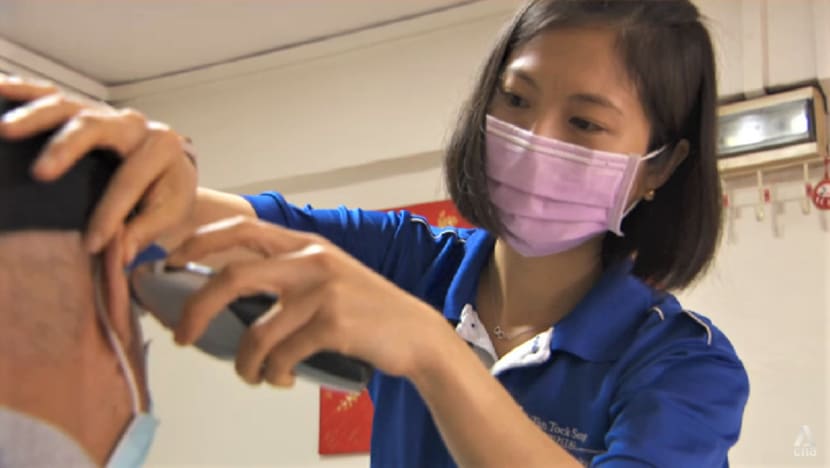Tan Tock Seng Hospital boosts community care for psychiatric patients
Community nurses making their rounds also keep a lookout for those who may have mental health needs, which allows for early intervention and access to specialist care.

Community nurse Grace Lai from Tan Tock Seng Hospital (TTSH) checks the temperature of a patient at his home.
SINGAPORE: Two years ago, Madam Lu was helpless when her elderly mother refused to step out of her house to seek medical care after hearing voices in her head that threatened to kill her.
“She got a strong belief that someone is trying to take over the house and kidnap her or kill her. So she's not leaving the home at all. That made it really very difficult, very helpless (for me), I didn’t know where to get help from,” Mdm Lu said as she recounted her experience to CNA.
Help came for both mother and daughter after a team from the Silver Generation Office (SGO) noticed her deteriorating mental condition.
Shortly after, Mdm Lu was referred to specialists at Tan Tock Seng Hospital (TTSH).
The visits to Mdm Lu and the subsequent referral to doctors were part of a community care programme by TTSH, in which community nurses making their rounds also keep a look out for those who may have mental health needs.
“On top of physical assessment and vital signs monitoring, we also look out for their mental well-being and detect issues such as low moods and coping issues, behaviour, and interaction with us and their caregivers, and watch out for any red flags,” said Ms Grace Lai, a TTSH community nurse.
Mdm Lu’s 86-year-old mother was assessed to have a delusional disorder and put on medication, while nurses gave Mdm Lu advice on providing care.
“Her condition was nearly out of control, she would shout or scold, sometimes hyper (for) 24 hours, non-stop. And that really affected a lot (of us), including the neighbours,” Mdm Lu said. “So, it's great that this healthcare team is here to help us, and after medication, (my mother) actually did see improvement.”
Together with community partners such as SGO, TTSH's community health team has helped around 100 patients like Mdm Lu since the hospital rolled out the pilot programme a year ago.
INTEGRATING PHYSICAL AND MENTAL HEALTH
Under the programme, the team provides community aftercare, integrating both physical and mental care at the homes of patients who have been discharged from hospital.
“For people with chronic medical conditions, a lot of them have a higher incidence of having mental health problems as well,” said Dr Megan Chan, a consultant at TTSH’s psychiatry department.
“The team also helps evaluate whether a patient has any psychiatric problems… which they will highlight to us and deliver simple interventions. Should the cases be more complex, then they will be brought back to us in the hospital.”
Apart from those transitioning from hospital to home, around three in 10 patients under the care model were referred from community partners – when social workers or volunteers make their own rounds to check on residents, and spot those who may have mental health conditions.
“They are really important because they are like our eyes and ears in the community,” said Dr Chan.
A majority of cases were those with depression, anxiety, or adjustment issues - conditions that might prevent patients from adjusting to new diagnoses or medications, thus affecting their moods or their motivation to get better, said Dr Chan.
In the case of Mdm Lu’s mother, her mental disorder led to an eating disorder as she thought that her food was being poisoned. This drastically affected her food intake, as she would only finish a quarter of a meal, and further worsened her condition, before the community health team stepped in.
MORE MENTAL HEALTH SUPPORT FOR SENIORS
Dr Chan said that the team, set up in the middle of the COVID-19 pandemic, was timely due to the increasing number of people seeking mental health advice and treatment.
The Ministry of Health (MOH) said that a study reported a stark increase in feelings of isolation for older Singaporeans during the pandemic, especially for those living alone, and added that social isolation is often associated with negative mental health outcomes.
“In recent years, we've seen an increase in seniors and caregivers requesting mental health support,” said Mr Tan Peng Heng, head of the Bishan-Toa Payoh SGO satellite office.
SGO is the outreach arm of the Agency for Integrated Care, which has 20 offices across Singapore to look out for seniors and connect them with the right information and care services.
“Mental health problems already exist but with awareness and house visits, we see and detect more cases, then we start referring them to support groups and partners,” Mr Tan said.
“We're talking long term because mental health issues are not short term, they are long term. Some could be quite mild, if you can intervene to help them recover,” he said. “But those that are more serious, and need long term care, the right support is quite important moving forward."
HELP ALSO AVAILABLE FOR CAREGIVERS
Along with patient care, the TTSH team also monitors if caregivers are coping well or experiencing burnout.
“Caregivers do feel the stress of having to manage patients or elderlies, sometimes even to the extent of having depression,” said Dr Chan. “So our team will try to advise the caregivers, and if necessary… bring the caregivers to the hospital for consultation or refer them to one of our primary care partners.”
Community nurses receive training every three months to refresh their skills in handling psychiatric patients with an aim to better integrate care. They also consistently enhance their skills in assessing mental health conditions, and guiding caregivers such as Mdm Lu.
“I will update (my mother’s) condition to the nurse. And then the nurse will feedback to the doctor. And also give me some advice. She's more calm now and not so easily agitated, and it's more easy to communicate with her,” Mdm Lu said.




















